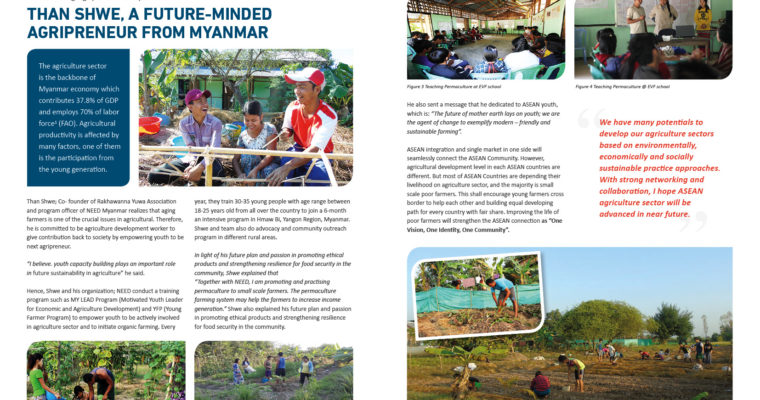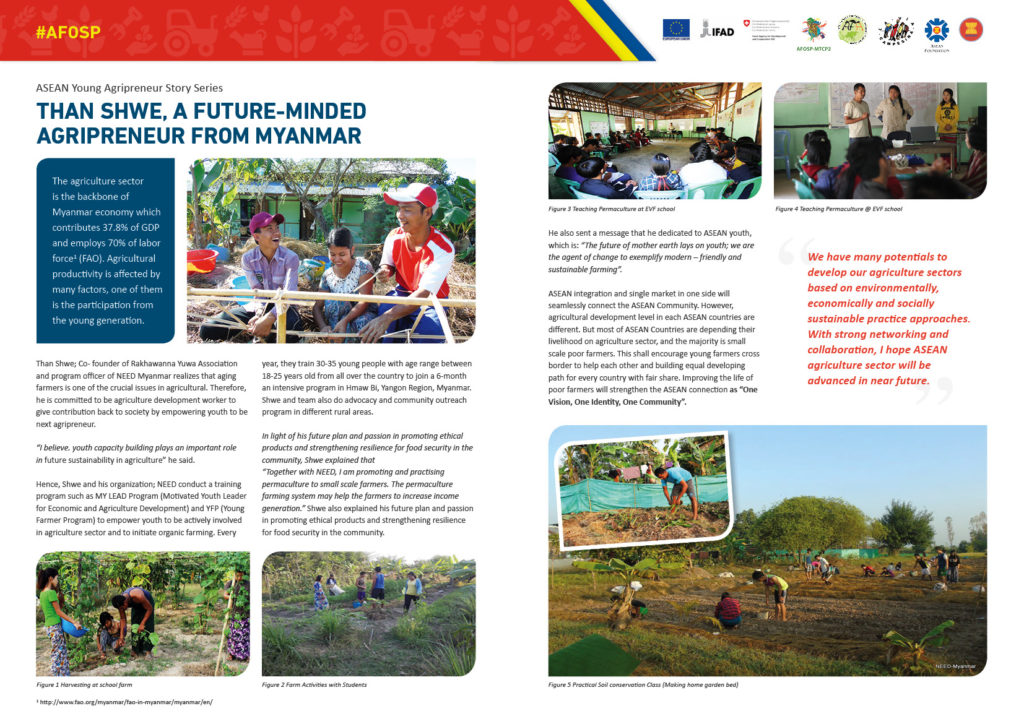Myanmar – The agriculture sector is the backbone of the Myanmar economy which contributes 37.8% of GDP and employs 70% of the labor force (FAO). Agriculture productivity is affected by many factors, one of them is the participation of the young generation.
Than Shwe, co-founder of Rakhawanna Yuwa Association and program officer of NEED Myanmar realizes that an ageing farmer is one of the crucial issues in agriculture. Therefore, he is committed to being an agricultural development worker to give contribution back to society by empowering youth to be agripreneurs. “I believe youth capacity building plays an important role in future sustainability in agriculture,” he says.
Hence, Shwe and his organization, NEED, conduct a training program such as MY LEAD Program (Motivated Youth Leader for Economic and Agriculture Development) and YFP (Young Farmer Program) to empower the youth to be actively involved in the agriculture sector and to initiate organic farming. Every year, they train 30-35 young people with ages ranging between 18-25 years old from all over the country to join a 6-month intensive program in Hmaw Bi, Yangon Region, Myanmar. Shwe and his team also do advocacy and community outreach program in rural areas.
Together with NEED, I am promoting and practising permaculture to small scale farmers. The permaculture farming system may help the farmers to increase income generation,” he says. He also shared about his plan and passion for promoting ethical products and strengthening resilience for food security in the community.
“The future of mother earth lies on the youth. We are the agent of change to exemplify modern-friendly and sustainable farming,” Shwe says tells other ASEAN youth.
ASEAN integration and single market on one side will seamlessly connect the ASEAN community. However, the agricultural development level in each ASEAN country is different. Most ASEAN countries are depending on the agriculture sector for their livelihood, and the majority are small scale, poor farmers. This shall encourage young farmers cross border to help each other and building equal developing path for every country with fair share. Improving the life of poor farmers will strengthen the ASEAN connection as “One Vision, One Vision, One Identity, One Community”.
“We have many potentials to develop our agriculture sectors based on environmentally, economically and socially sustainable practice approaches. With strong networking and collaboration, I hope the ASEAN agriculture sector will be advanced in the near future,” Shwe says. #
About MTCP2
The Medium-Term Cooperation Program Phase 2 (MTCP2), a five-year capacity building program supported by the International Fund for Agricultural Development (IFAD), the Swiss Agency for Development and Cooperation (SDC), and the European Union (EU) , has been implemented in 22 countries across three sub-regions—Southeast Asia (through the ASEAN Farmer Organization Support Program-AFOSP-MTCP2), South Asia, and the Pacific—engaging 86 national federations of farmers organizations with 1,628 sub-national farmers organizations (FOs) with a total membership of around 43.5 million small-scale women, men and young farmers. The funding support (12 million USD) served as a catalytic fund that allowed FOs to enhance their capacity to engage in policy dialogues and to be effective channels of economic services to farmers. The program has contributed to the formation of strong national platform of FOs with improved capacity to engage in constructive policy processes and mobilize resources from mainstream agricultural development programs like extension services, credit, and pre and post-harvest facilities. The program also helped in re-structuring farmers’ associations into community-based social enterprises or as commodity-based cooperatives as well as consolidating FOs into agricultural cooperative federations/union to strengthen the role of small-scale farmers within an inclusive and sustainable value-chain. The program is being implemented by the consortium Asian Farmers’ Association for Sustainable Rural Development (AFA) and La Via Campesina (LVC).





Comments are closed